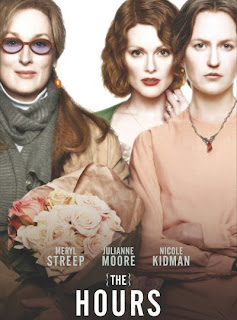

The hours was a definite favorite of mine. Although many people thought it was long and boring, I thought it was one of the years best films. The story follows three women, each in a different era of time. The most famous woman in this story is Virginia Wolf. A famous writer, a poet, and a manic deppressant. The director does an excellent job of showing the different states of mind that Virginia goes through. How she goes from independent strong woman, to the confused and scared mentally ill patient. She struggles with her desease for a long time before deciding to commit suicide.
All of our characters in this movie struggle with an internal conflict, a mental despairity if you will. Our 1950's character played by Julianne Moore is depicted as having the "all- american" life. She is a typical housewife living in suburbia, finding that she is deeply unsatisfied with the life she leads. Apparently being a wife and a mother was not as fulfilling as she thought it would be. This character is constantly taking valium and contemplating deserting her husband and young son. She even goes as far as leaving the boy with a babysitter while she goes to a hotel room and contemplates suiced by overdosing on valium. The scene is illustrated with her lying on a bed as the camera pans out above her. After swallowing her pill and closing her eyes, the hotel room begins to flood from underneath the bed. A hhuge swell of water is uprising underneath her. I believe this represents the torment and unhappiness she had inside her, she allowed it to accumulate and now it was swelling out of her.
Our last character, played by Meryl Streep, was set in modern times in upbeat New York city. Her story is somewhat different than the rest of the women. But her internal conflicts has to do with a man she loves deeply, whom is dying from the AIDS virus. Although a lesbian in this movie, she still carried feelings for this man she used to be with. And unlike all the friends that shut him out once he became sick, she would visit him all the time. She cared for him in a way that was unconditional and beautiful. In the end, the man sees that his state is depleting and decides that he doesn't want to suffer, nor does he want his love to suffer. So the last time she visits him, he is sitting on his window ledge. They speak for a brief moment, and while at first Meryl Streep tries to talk him out of suicide, she sllowly begins to understand his pain as the scene progresses. So she sheds some tears and tells him she's always loved him. In that split second, the camera moves away from him and then goes back to show an empty window ledge. As terrible as it sounds, there is almost a serenity or peace that overcomes our character after her love is dead. Perhaps is was illustrating unselfishness or a profound sense of understanding suffering. Like many of the indie films I like to watch, I enjoyed this film because of the directors ability to portray deep human emotion and internal conflict.







